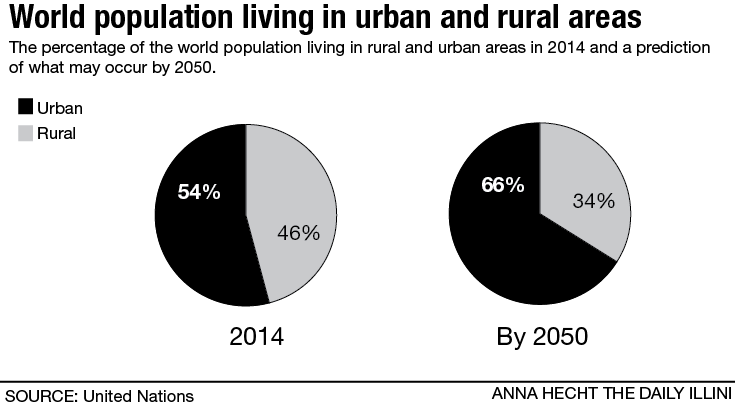University leaders travel to Taiwan to attend “Smart Cities, Healthy Cities” forum
Nov 4, 2014
Last updated on Nov. 28, 2016 at 09:11 p.m.
Administration and faculty members of the University are attending a forum on “Smart Cities, Healthy Cities” Monday and Tuesday in Taipei, Taiwan to discuss the impact of increasing urbanization. Chancellor Phyllis Wise, Vice Chancellor for Academic Affairs and Provost Ilesanmi Adesida, and Vice Chancellor for Research Peter Schiffer will attend the forum and continue to build a relationship with the National Taiwan University.
A number of University employees including three deans and 24 faculty members will also attend the two-day forum.
Director of the Illinois Strategic International Partnerships Timothy Barnes said two faculty members, William Buttlar, civil and environmental engineering professor, and William Sullivan, professor in landscape architecture, were major contributors to the research that will be discussed in the forum.
Buttlar said to serve the society of today and tomorrow, the community will need smarter, better and more comprehensive solutions to face challenges.
Get The Daily Illini in your inbox!
“Our campus really understands the need to do interdisciplinary research,” Buttlar said. “If we’re going to solve the remaining grand societal challenges, we’re going to have to use new research methods.”
Barnes said as urbanization increases, researchers studying this topic are looking into making cities more livable by focusing on cleaner water, traffic control, greener infrastructure, better access for people with disabilities, proper disposal of waste. He said researchers are also considering how diverse populations can live and work with each other.
Sullivan has been working for the past 20 years to determine nature’s impact has on people.
“When people have access to green spaces, a whole bunch of good things happen,” Sullivan said. “People being able to pay attention more effectively, to recovering from stressful events more quickly, to having stronger ties with their neighbors.”
Melissa Edwards, director of research communications, said the faculty and administration visiting Taiwan are promoting research collaborations regarding approaches to the challenges that come with urbanization.
“Our researchers are focused on addressing society’s most pressing problems by doing what we do best — interdisciplinary research that drives positive change in our communities, our state, our nation and the world. This is just one of the many, many research areas that our faculty have been pursuing for years,” Edwards said.
Barnes said these are not issues that one person can deal with on his or her own, which is why faculty attending the forum come from many different University departments, including: FAA, ACES, Social Work, Applied Health Sciences, Engineering, LAS and Education.
According to Barnes, the relationship between the University and east Asia goes back to Edmund J. James, the University’s president from 1904 to 1920, who encouraged Theodore Roosevelt to give scholarships to Chinese students to receive higher education in the U.S. He added that an increase in the amount of students from east Asia during that time is what led to the establishment of a strong connection between the University and the National Taiwan University. He added that more than 70 faculty members from the National Taiwan University have received a doctorate degree from the University.
Sullivan said the University members are meeting with members of the National Taiwan University to collaborate on papers and joint research on some of the most pressing problems that society faces today. The University and National Taiwan University plan to continue the “Smart Cities, Healthy Cities” forum annually for at least the next two years. Next year, the forum will be held at the University.
“The benefit to the students is the same as the benefit to the faculty and the benefit to the community around us and the Chicago community,” Barnes said. “We’re bringing the campus and positioning it in a place where it can address significant sociocultural issues more effectively, by teaming with a partner institution that is doing similarly innovative and cutting edge work, research and education.”
Ali can be reached at [email protected].






